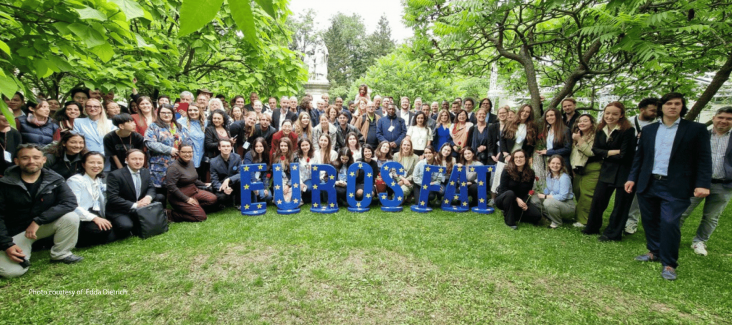Held in Bucharest, Romania, from May 15-18, the Forum attracted over 400 participants from every continent, representing around 50 countries. This diverse crowd included civil society members, academics, activists, and political representatives, reflecting the global importance of direct democracy and participation beyond the polls in this historic election year. Around the globe this year, more people than ever in the history of human kind will vote, but also for Romanians 2024 is a major voting year, with elections on the local, national and European level in the next months.
The Forum was co-hosted by Democracy International, Europuls, the City of Bucharest, the University of Bucharest and the Swiss Democracy Foundation, along with the assistance of permanent partner Mehr Demokratie and many other partner organisations.
At the Forum, 197 speakers led the participants in a variety of workshops, panels, and bootcamps. In total, there were 70 sessions that explored contemporary issues of direct and participatory democracy in relation to peace and security and technological and media innovations. Special tracks were dedicated to the European Union, with one of this year’s largest democratic excercises currently underway in a defining vote, and local democracy, with municipalities around the world proving to be a hotbed for democratic innovations.
For international participants the Forum kicked off with a three-day pre-Forum briefing tour ahead of the main conference, learning about the history of Romania’s transition to democracy after the Ceaușescu dictatorship and visiting Romania’s Youth Capital Ploiesti.
The conference itself started on Wednesday evening with an opening session in the Romanian Parliament, the second-largest administrative building in the world, which can be seen from space and is a relic from the dictatorship era, but since has been reclaimed by Romania’s democracy and rebranded “the people’s house”. Special attention was devoted to the war in neighbouring Ukraine and its effects on democracy in the country and in the region, with Ukrainian speakers joining via video link and the Ambassador of Ukraine to Romania, H.E. Ihor Prokopchuk, joining the session. In his Keynote speech, Ivan Vejvoda, Permanent Fellow and Head of Europe’s Futures Program at the Institute for Human Sciences, discussed the implications of renewed war in Europe and our duty to defend our democracies from those who attack it.
The rest of the Forum took place both in the Revista Theater in central Bucharest and at the Campus of the University’s Faculty of Sociology and Social Work. The conference programme was created in a participatory manner, with over 70 organisations contributing to panels and workshops.
The main theme of this year’s Forum was trust. Trust in institutions, trust in elections, trust in citizens and trust in democracy itself. With elections ongoing or scheduled in Europe and across the world, speakers stressed the questions of strong institutions and direct and participatory democracy instruments to ensure that citizens have more sustainable and varied access to decision-making. “Voting is not only a matter of responsibility, but also a matter of choice. And we are ready to make a choice when we trust the process,” Tana Foarfa, the Co-Chair of this year’s Forum said at the opening session in the Revista Theater.
Especially in times of democratic backsliding and with the rise of undemocratic elections, serving to prop up authoritarian regimes, it is more important than ever to follow processes closely and to differentiate between best and worst practices. “Autocrats uphold the pretence of democracy because they know the enduring power and appeal of democracy and they are scared of us. They know that when we cooperate, we are strong,” said Caroline Vernaillen, Co-Chair of the Global Forum.
With statistics showing that young generations especially are losing faith in democracy itself, the Forum had a special focus on youth, with multiple sessions dedicated to the topic and a record number of young participants from Romania and around Europe.
With the European Union elections in sight, the well-documented participatory practices on the European Union level were another key area of intererst. On Friday, the main candidates running for the European elections debated each other on stage in the Revista theatre, in a discussion that was also broadcast live on Euronews.
One of the major highlights of the Forum was the launch of the first-ever Global State of Direct Democracy Report. This report provides a comprehensive overview of the events and trends in direct democracy throughout 2023, covering legal provisions, recent referendums and reforms. The report provides a detailed look at the main trends regarding direct democracy in the past year, concluding the risk that the use of less-than-perfect direct democracy instruments such as plebiscites and referendums to validate constitutions proposed by autocratic leaders put to democracy and direct democracy around the world. By highlighting important details often missed in other databases and the difference between prevailing practices and best practices, this report aims to foster meaningful discussions and enhance understanding of direct democracy.
The Forum concluded with a powerful Closing Declaration, co-drafted by the participants. The declaration emphasises the essential role of trust in sustaining vibrant democracies. It stresses the importance of trust in institutions, the media, and in each other, and calls for active citizenship, transparent governance, and robust democratic practices to nurture and reinforce this trust.
More importantly, the declaration highlights democracy's role in peace and conflict resolution, noting that participatory mechanisms and inclusive governance structures are crucial for preventing conflicts and fostering lasting peace. Stating “As we deliberate on the challenges facing the world today, including war, populism, climate change, and pandemics, we reaffirm our commitment to leveraging democratic tools to address these global crises and promote stability and prosperity for all.”

